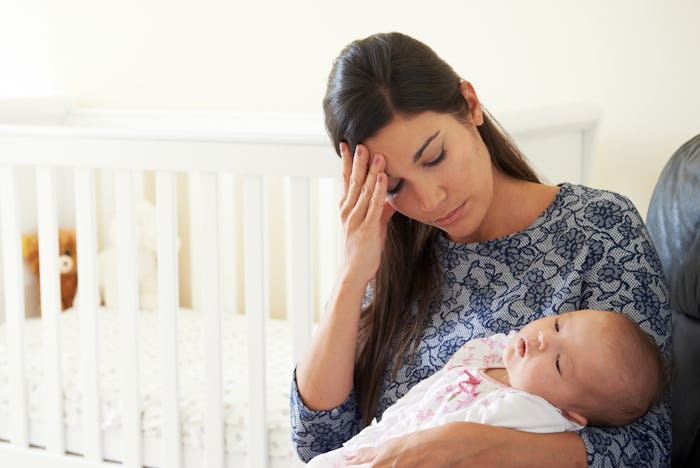Life

7 Habits That Make Your Baby Think You're Stressed
Everyone internalizes and deals with stress differently. But not matter how much a person may try to quell their stressed feelings, especially around a baby, sometimes it's just completely unavoidable. It's best to try to minimize stress for a plethora of health reasons, but probably the best reason: your baby can sense it. Unbeknownst to you, you may be exhibiting habits that make your baby think you're stressed without even realizing it.
There's no doubt about it — parenting is stressful, especially when you add in all the other annoyances of life. You're not a bad parent for getting burnt out and even unhinged from time to time, it's totally normal. Even when parents think they're putting on a good show for their kids and acting like everything is fine, chances are the kids know something is wrong and that things are not fine. Verbal and non verbal cues go a long way in telling the world you're worn the hell out.
Despite how new they are to the world, babies are actually pretty sensitive to the world around them. They can pick up on all sorts of information, including your stress level. Here are seven ways you may be showing your baby that you're operating on overload.
1You Have A Mostly Unresponsive Or Apathetic Face
Babies can pick up lots of information about their environment, including your frown or resting b*tch face. Stressed out mothers that grimace or show no emotion on their faces can inadvertently trigger their baby, which can result in "secondhand stress," according to Baby Center. These are considered negative emotional cues and their impact is pretty intense. The site also cited a study, which found that babies who were subjected to negative emotional cues from their mother reacted physiologically with a heightened heart rate. A higher heart rate is a sign of stress, which means the infants in the study could tell their mothers were stressed out and seemingly "caught" their mother's contagious anxiety.
2You Yell Or Fight Around Your Baby
When people get stressed out, they can sometimes get combative. It doesn't matter whether you're yelling at yourself, screaming on a phone, or bickering with your spouse, your baby picks up on it. According to Live Science, researchers found that babies register the stress from arguing, even while they're sleeping. Additionally, exposure to high levels of stress can change chemicals in the body and can even stunt a child's brain. It's unclear whether the effects are temporary or permanent.
3You Don't Cuddle Or Caress Your Baby
Parents who are stressed out may habitually avoid physical touch with their babies. It's not intentional, and it's OK as long as you notice it's an issue and work to correct it. According to Parenting Science, nurturing touch appears to protect babies from harmful stress. When a mother cuddles her baby, oxytocin, the "love hormone," is released, which may help to calm a baby and even chemically switch off cortisol (a hormone released during stress).
4You Cradle Your Baby On The Right
How you cradle your baby could be sending stress signals to them. According to a 2017 study published in Nature Ecology and Evolution, left side bias or left cradling bias, aids the right side of the brain in processing emotions and taking in information from our environments.
Researchers in a previous 2007 study published in the Journal of Child Psychology and Psychiatry, found that 65 to 85 percent of mothers cradle their infants on the left side of their bodies, however, the preferred position seemed to change if the mother was stressed or depressed. This study is 10 years old, but the two pieces of research together strongly points to a correlation between how you cradle and your emotional state.
5You Don't Respond To Your Baby's Cues
Stress is distracting for everyone and can cloud all tasks including, but not limited to, taking care of an infant. If a parent is stressed and distracted, they may not pick up on their baby's cues. A baby can tell it's not being responded to by it's caregiver and will likely react accordingly (crying, screaming, flailing), according to the aforementioned post in Parenting Science.
6You Don't Engage One On One With Your Baby
A stressed out parent may tend to disengage. No one is saying that you have to be intimately engaged with your child every single moment, of every single day, but regular one on one interaction is important. According to the Help Guide website, making time to connect and bond with your baby helps secure a healthy attachment between a baby and their caregiver which in the end, makes everyone feel less stressed out.
7You Don't Make Yourself Emotionally Available At Sleep Time
If you're stressed out, it may be really tempting to rush through the bed time routine and crawl into bed or zone out to Netflix. Doing so every once in awhile or for a finite time is probably fine. The above Parent Science post noted that it's important for caregivers to be physically close to their babies before sleep, but they should be as calm and irritant free as possible, so as to not stress out the baby. Being emotionally available for your infant at night, can help them regulate their stress all day long.
Chances are if you're stressed, you know it. Again, it's totally OK if you're stressed occasionally or temporarily, but turning your stressed behaviors into habits is a problem. Getting help if necessary is the best thing you could do for you and your baby.